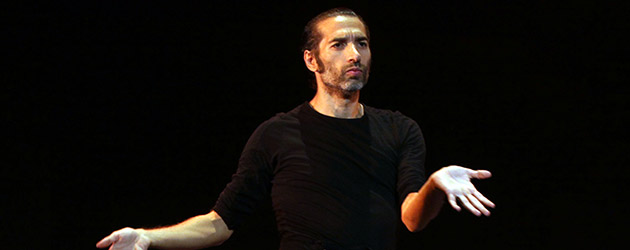Text: Estela Zatania
Photos: Antonio Acedo
Israel Galván «Flacomen»
18th Bienal de Flamenco de Sevilla
Sunday, September 14th, 2014. 8:30pm. Teatro Lope de Vega
AN ISRAEL GALVÁN APT FOR ALL AUDIENCES
Director, choreography and dance: Israel Galván. Musicians: David Lagos, Tomás de Perrate, Eloísa Cantón, Caracafé, Proyecto Lorca (Juan Jiménez Alba, Antonio Moreno). Artistic director and choreography 'sevillanas': Pedro G. Romero. Stage director and choreography 'alegrías': Patricia Caballero.
After recovering from the previous night that had featured the most noteworthy flamenco stars of Jerez, and a recital of classic cante and dance with Rubio de Pruna, Toñi Fernández, Lucía Álvarez «La Piñona» and «El Barullo», we fast-forwarded to a timeless and little-defined zone where Israel Galván makes the rules as he goes along, depending on his own expressive needs at any given moment. Midday, at the Chapel of the Palacio de San Telmo, José de la Tomasa and Manolo Franco had debuted their project «Flamenco Sacro» with soloists of Seville's Orquesta Barroca.
Analyzing the artistic personality of Israel Galván is always daunting. Few people nowadays would deny him the status of genius, but some of his works are uneven or difficult to digest for the man-in-the-street flamenco fan. Unconditional freedom of expression is a powerful element that only a privileged few are capable of managing, and Israel himself doesn't always get it right. Some of his creations have been obscure and slow, far removed from any reference to flamenco, with an overdose of intellectualism that overshadowed the theater experience which, above all, is supposed to be positive, edifying and/or enriching.
In this new show, Israel has tapped into the middle-ground of his boundless creativity. The avant-garde dancer rejects the dark conceptualism that occasionally marred previous work, but at no time does he fall into the trivial o merely entertaining. «Flacomen» is a delightfully entertaining show, in the most noble sense of the word, and in fact, it is possible the sprinkling of comic details is partly responsible for its success. Israel lays down the law while simultaneously warning us not to take things too seriously.
Paco de Lucía, in whose honor this edition of the Bienal is being celebrated, declared many years ago: «Why should he talk with ten words, when we can use a thousand?» Israel Galván's philosophy could be defined with that same phrase. An expanded vocabulary carries the responsibility of knowing how to administer it, and here the dancer gives himself up to the forms of flamenco, an element which he has occasionally eliminated in previous work. Flamenco fans are capable of accepting nearly anything if it's served up in the framework of the forms. Put them aside, and you enter into slippery artistic territory that only the most diehard fans can assimilate.
In this work «Flacomen», as always, there are androgynous details: no one can accuse Galván of sexism. The pseudo sevillanas seguidillas danced by the entire cast of men who then abandon the stage on tippy-toes like the corps de ballet of Swan Lake, is an unforgettable image that delighted the audience. There's a new vocabulary of Galvanic movements, always taken from the dancer's same dictionary, while other characteristic moves have disappeared: Israel's creativity does not allow for maintaining old habits once they have run their useful course.
On the upside, there is the visual relief of light and color that Israel now permits us…could this be the beginning of the end of all the darkness in flamenco shows? «Fui piedra y perdí mi centro», one of the most beautiful and mysterious verses of classic flamenco singing, is obsessively repeated a hundred different ways, becomes a motif. Musical and vocal fragmentation is ably applied to great effect. Alegías with bulería, like you never saw it in your life, is a small master-work in which the genius of Israel Galván finds its most flamenco outlet.
Israel is backed up by genuine flamenco artists David Lagos and Tomás de Perrate, as well as guitarist Caracafé, seldom seen on these stages, in addition to Proyecto Lorca and the versatile Eloísa Cantón, all of them essential to the show. Tomás de Perrate has proven himself to have a surprising interpretive capacity as actor…not everyone is capable of credibly singing soleá with gibberish «verses», in addition to other equally wacky chores he had to perform.
Those of you who reject the work of Israel Galván as too «difficult», can attend this show without fear, you will not regret it.
At eleven o'clock, singer Rocío Márquez debuted her show «El Niño. Andando por los Campos Marcheneros». With the special collaboration of Pepe Habichuela, in addition to Manuel Herrera on guitar, the electric guitar of Raúl Cantizano, the percussion of Antonio Montiel, chorus work by Los Mellis and el Niño de Elche and the Cuban tres of Raúl Rodríguez, the young Huelva singer delved into the artistic personality and work of the singer who was a cult figure for a half-century: Pepe Marchena.
Between the first classic cantes, and a second part based on synthesized rock music that was out of place, there was a brief interlude where Rocío located the reality of the admired singer, managing to update his work through the prism of her own personality.
